Customer Experience Management
An article published on the basis of a report from the Outsource People Kharkov 2013 conference .
Report video:
I am a representative of the "Testing Laboratory", we have an office in Moscow, as well as in Belarus. We carry out outsourcing projects. Also very famous as organizers of training and conferences. For example:
• SQA Days
• SPM Days
• Analyst Days
These are the leading conferences held in Russia, Belarus and Ukraine. As a representative of an outsourcing company, we will talk about the service business for those who are on the side of the contractor.

When you come to your doctor, he knows about your illnesses. So in our history, when the customer has been working with you for a long time - to work with him quickly, easily, efficiently, you understand him perfectly, you know all his sores and you can easily advise him something. About the outsourcing business, we will say that people come for development (software), but such a part as service also stands out. Not just came or ordered, received and left, people care about the quality of service! Of course, such a component as value matters, but we will not focus on it much.
On the other hand (from the consumer), we can say that instead of development, the goal of the business is profit, money received from the customer, and in terms of service, this is customer loyalty. If we serve well, we get a loyal customer. And our situation becomes similar to the CAFE business, where sometimes what you order is not so much even important to you, but how you will be served.

For example, when you use the services of a service station, you act as a customer or place an order in a cafe, try to pay attention to what is pleasant to you, as a customer, in some little things that surprised you. And here you can learn something for your consumers. If something pleasantly surprised or touched you, mark it and try to project it on your own business, on the business of an outsourcing company, maybe you can apply something similar to your customer.
One customer commented that “plans, schedules, reports are good, but the main thing is the impression.”
Outsourcing is difficult to evaluate identically. Evaluation is always subjective, and subjectivity is of great importance. It is important for the client what impression he has about the company. If he likes the company, he is ready to work with it and will see what happens. Sometimes it is not possible to make an unambiguous assessment, therefore, subjective assessment and customer experience are very important.

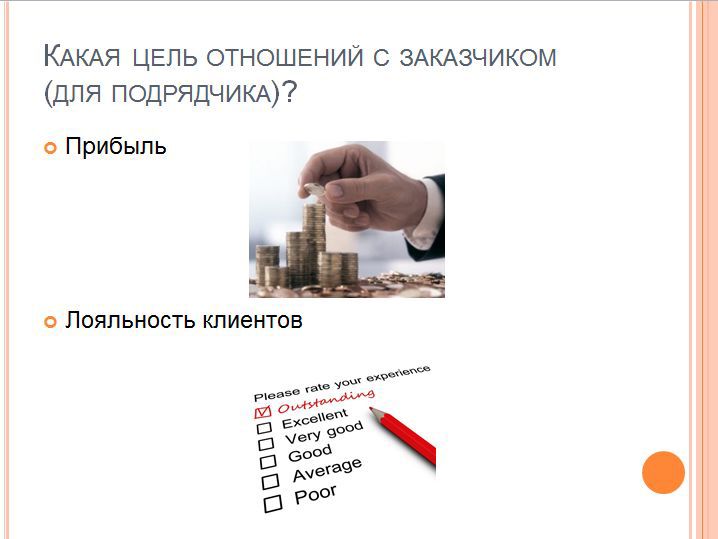
Consider the structure of relations in the company and between the customer and the sponsor. The sponsor is the one who gives the money, and the work itself is carried out by the project manager, who reports to the sponsor. There are people of the Customer. On the outsourcing side, for example, the Director of the company, there is a project manager who “beats with his heels” for the success of the company and ensures interaction within the outsourcing company. There is an outstaff: programmers, designers and other workers. Global interaction is possible when discussing an order with the participation of the owner, but as a rule, the whole dialogue is built at the level of project managers from both one and the other.
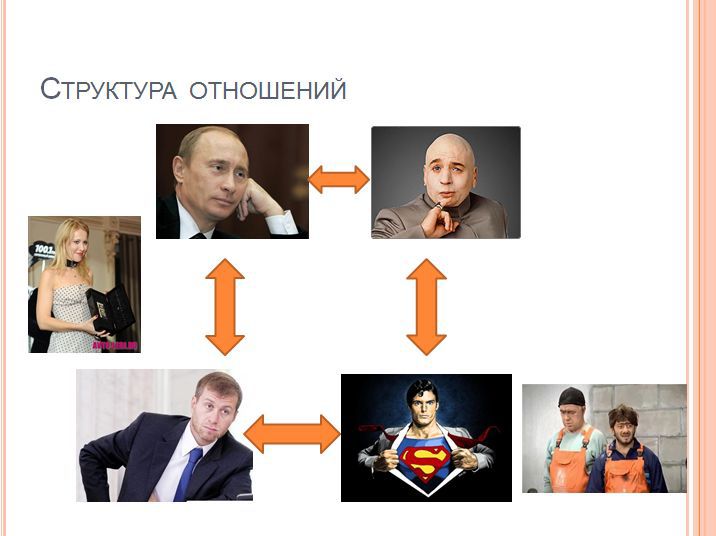
A good question arises: “Which of the people on the customer side is the customer directly? Who will we impress? ”The CEO of the company, the owner of the company or the project manager - who is the target? Who will we influence?

I don’t know who would choose whom, but an outsourcing company would choose all the customers, it’s not for nothing that I chose so respected and famous people for the illustrations.
In the previous slides, you saw that the project manager is in close contact with the sponsor. If we communicate with him, then his thoughts about the outsourcing company are transmitted to the sponsor. A difficult question: “Who and how will really evaluate you?”. Ideally, you need to have good relations with all representatives of the customer. There are also some corporate points. There may be conflicts with the local project manager, who will pass on his failures to you, and this will leave a negative imprint on the outsourcing company, and will also slow down the work. In this case, you need to try to go higher than he, to reach the sponsor or other management and solve all difficult moments. As a customer you need to see any company representative, even outstaff.
Even if you come across such people, it is better to have a good relationship with them. The project manager, with whom there is close communication, should be well handled so that he broadcasts his good impression of your outsourcing company and recommends it within his company. Indeed, in some companies of the customer parts of the project were transferred to India, Ukraine, Belarus and there is the possibility of revising the budget. Accordingly: “And who is the service for servicing such clients? This is the owner of the company, project manager, who should do this? ”
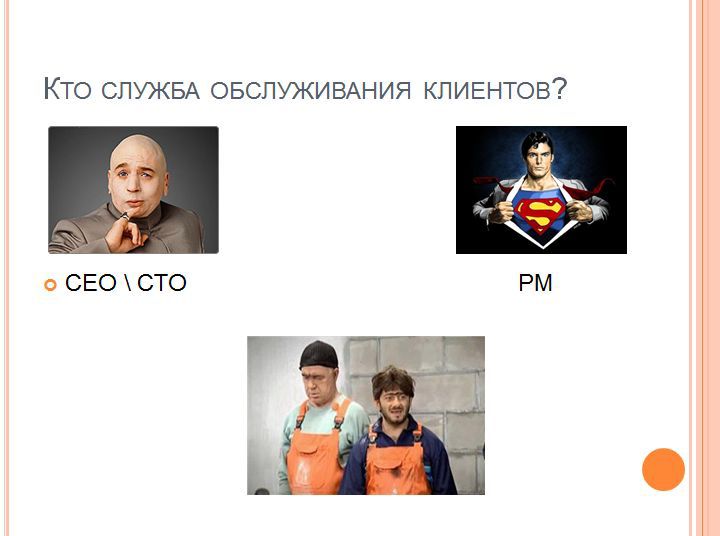
I would say that a service is all the people who work with customer representatives. This is both outstaff and programmers, if they contact the customer directly, if this is accepted by the company. Not all companies have this practice, in some it is conditionally prohibited. There are cases when there is contact with the client - this also creates an opinion about the company.
What programmers do we have - such is the opinion. We recommend that communication takes place with a more experienced person in communication with customers. And programmers are technical people from whom you should not expect the right interaction with the customer.
Traditional methods of communication: telephone, skype, email, you must also consider non-traditional ways of communication with the customer.
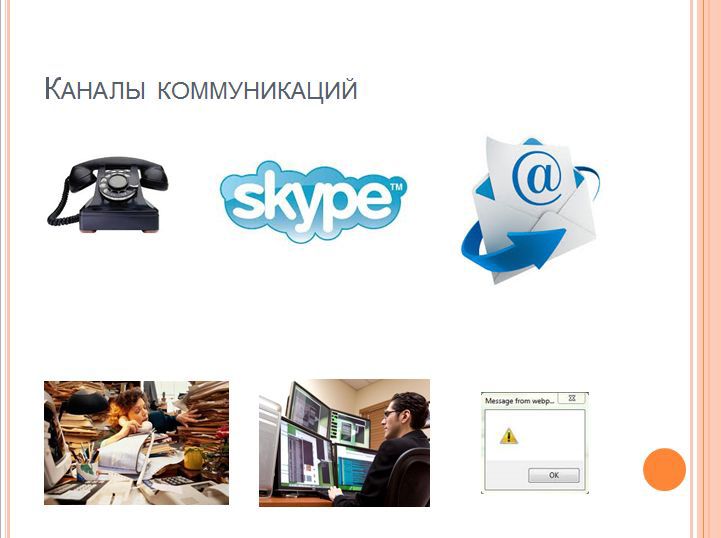
Bookkeeping, for example, solves issues with an account manager, and they can be unpleasant for the customer and a bad, unnecessary background can be created for you, as a contractor. Or messages of programmers, debugging information in software - all this also speaks of the quality of services and forms the opinion of the customer about the contractor. It is necessary to maximally simulate the channels that carry information to the customer.
An interesting fact is that Hitachi in 2006 found for themselves that 85% of customers build all relations with the organization and the brand as a whole according to the experience of communication with the contact center employees. But it’s true, because no one can see the processes that occur inside the company, even super ones - to competent top managers!
“Customer Testimonials”, Hitachi UK, 2006
When you call the contact center and are poorly explained or even rude to you, you make a conclusion about the entire corporation. Approximately the same is broadcast to the outsourcing business. Conclusions are drawn from communication with the client, even the rating is not taken into account, if he was rude, he will not work with you.
If we consider the situation on the part of the customer - you come to the service station, what are the most interesting things that you expect to hear from the contractor, so that your relationship becomes more transparent, clear and you would like to work with this contractor, and not run across the road and look for another? Speak out what things you would like to hear?

Transparency of the procedure itself. The man came and he should have an understanding that he was heard, there is an action plan, and he sees that the work is ongoing, and in a week part of the work will be ready, there is an assessment and a contract.
The problem of a “common language" requires attention - a separate topic for an entire lecture. Sometimes the customer communicates in his “bird” language, and an outsourcing company seems to hear it, but in a completely different way, broadcasts everything to him in other terms and there is a misunderstanding. These omissions can develop into more. ... Even at the level of TK, the terms can be interpreted ambiguously. This is a slippery, global theme of understanding between the customer and the contractor.
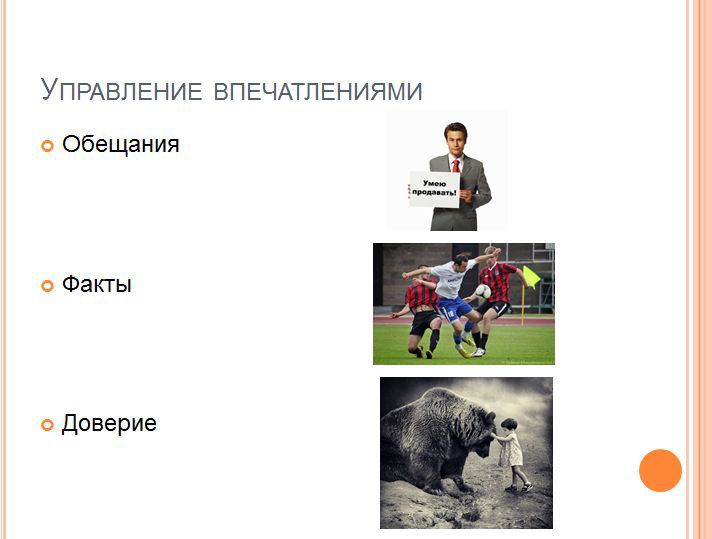
Professionalism, friendliness - the list is quite large, but some things are quite obvious. To manage impressions, a model is built. There are village managers - they promised a lot, then the time comes for facts, work is in full swing, something is moving, and we get results. If the company fulfills what the managers promised, then we gain confidence as a company that is responsible for its words. And if the managers promised, and the company made only 10% of this and almost died in work, then the customer’s trust can be undermined.
Conclusion: less promise, but more is recommended.
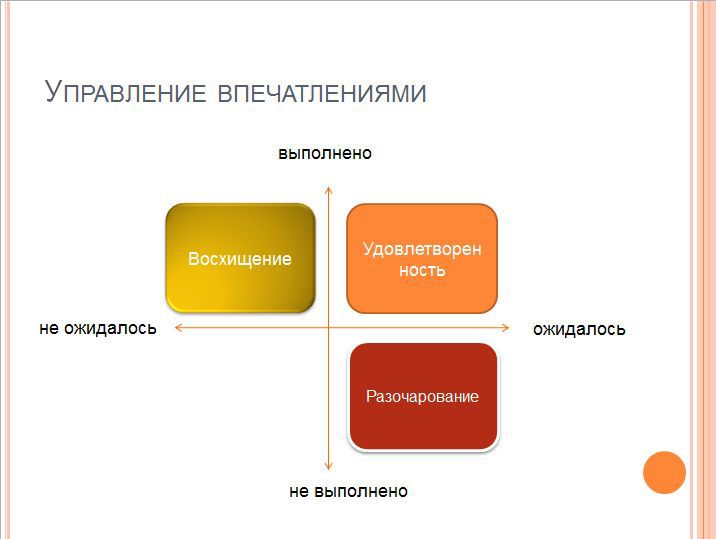
If we consider such a model, we have “expected-not expected”, “completed - not completed”. The top right sector “Satisfaction” is when we promised and did nothing special. If something was expected and not done, then generally a failure. But, in fact, our function is to surprise, it is pleasant to give the customer. That he fell in love with the company, called his friends and brought new customers. Our goal is to accomplish things that were not expected, but would be pleasant, and aroused admiration from the customer. One well-known recommendation: Do not promise, but overfulfill .
Give presents. You heard that the customer really needs some kind of chip, and according to the plans it is in a week, and you give it out in two days. And sell him this idea and say that you removed people from other projects. You heard that he needed it and tried to do it faster. If you managed to do something faster - sell it as a feat, you are so tensed, undermined, it was possible in a week, and you did now: “I hope you like it”.
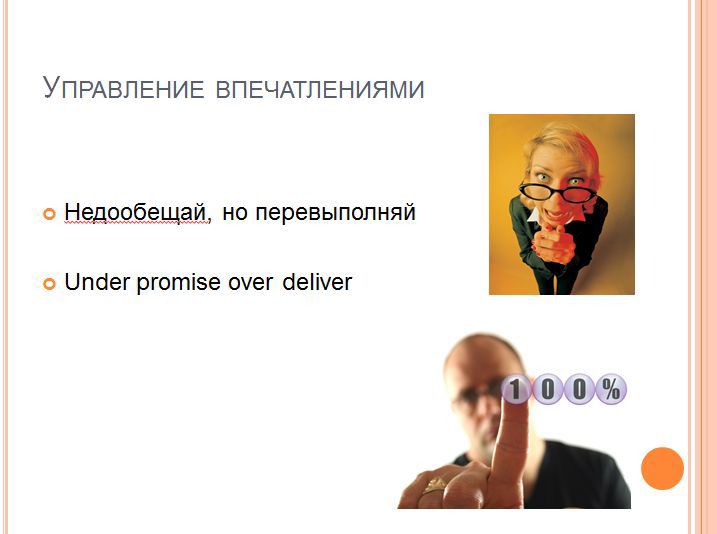
There is an interesting book , Economics of Impressions, by authors Joseph Payne and James H. Gilmore, who argue that modern economics has already left the old classical model - the commodity economy and the service economy and has entered the realm of impressions. It’s not enough for us to simply buy goods, not even enough goods with the service — we need a wow.
In 2002, Israeli-American psychologist Daniel Kahneman received the Nobel Prize in Economics. Classical textbooks on economics argue that the economy is rational, the classic textbook proves that a person makes rational choices. A bad product must die, and a good one must be successful. In his research, Daniel Kahneman demonstrated fairly well that the modern economy is rather complex and irrational. And far from being as classical as the textbooks on classical economics require.
A simple example: you come to the store - there are a lot of laundry detergents. How to unambiguously evaluate which one is better? One is more expensive, but in fact it may not be worth the money. The other is cheaper, but in fact it does better than expensive. Half of the market participants buy something from-
The choice is quite subjective .
There are TV shows such as: “Consumer”, “Your Choice”, where information about tests, chemical compositions of powders, where mothers with many children are asked, what kind of powders they wash, which are good, which are bad — they collect detailed information and more reasonably report that some then the powder, in their opinion, is worth the money, and some is not worth it. But you all understand that these programs were seen by 10% of buyers and have a balanced point of view about a particular washing powder. And most of them buy for some irrational reasons, because they liked something.
Our duty is to form a rational impression on the customer, because he is not able to objectively evaluate you in your abilities, even to form a better opinion than you are really worth. We will strive for this.
Another important point - time dulls the impression. If we believe in impressions, and gifts are given to us every day, then in a month you will ask: “And that’s all? Something is not enough, I want more ... ". This recommendation - “promise less, but exceed” is good, but you can’t follow it 100%. If you do this all the time, you will drive yourself into it, and the fact of constant gifts slightly devalues the fact of gifts.
Here you need to change the process. If there is a gift - it must be explained that it wasn’t from a floundering bay — they came and presented, but tensed, made sacrifices — you need to sell the gift. It must also be said that next time this will not work - just an exceptional situation. There were free people on the project, and we threw them. So that the customer would not expect and the gift would be a pleasant surprise for him, and not that he would say that it is so cool and since you can hand over everything twice as fast as planned, let's reduce this plan!
It is necessary that the customer understands that the gift is an exceptional situation - they really tensed, worked at night, and maybe they should throw a bonus - but it was a gift, with a victim.
Next, involve the client in the development, so that there is no opinion that you came, took the order and returned only with a positive result - it turns out to be a solid positive, such cool guys that they then slow down would often come with good news. And if you will involve in the development, cause empathy in him - that’s the time frame that needs to be lengthened so that he gets involved in the essence of the problem, realized that somewhere you did a feat, presented something, but somewhere you have to move the terms - he too must go to a meeting.
There are 2 Internet providers on the market. The old one has many clients, it works well, well, relatively well, there are always problems, but it performs its function. But what’s the trick: service companies have a sin, as with the Internet, do you all know your Internet provider? Who is your ISP in the company? Very often, the name is remembered only when you need to call support and angrily yell everything that you think about them.
If everything is fine with you, everything works and you are sent to send a letter of thanks or call customer support or hang out in the queue for half an hour and say “thank you - you work great”, there is no desire. But when something does not work, here you recall. What is your opinion about the Internet service provider? - It focuses on the negative. When it’s bad, you call there, and when it’s good, it should be so.
And they really have a catastrophe there - equipment will fall in a day, but you don’t know all this. Only two technical specialists serve 100 clients, they make sacrifices for the sake of clients, and you do not know anything. And you don’t want to understand this and you don’t need it, you have enough of your own affairs.
And then a new provider appears on the market - he has capacities with a gulkin nose, and he comes and begins to unfasten customers. And why? Because he comes and asks: “Guys, how is your relationship with the old provider?” “It seems normal, but there’s a jamb, then there.” “And let’s come to us - we won’t have any mistakes. We have new super technologies. And the old one has the old technology - in general, it must be forgotten. ” Well, the client agrees and decides to try.
We mean here that, nevertheless, the old Internet provider fulfills its obligations at a good level, and the new one didn’t actually offer anything revolutionary, it is the same, but it is missing customers because the customers are tired and they still have a negative background about their provider. How did the old ISP solve this issue?
Prior to that, he did not have a customer support service, he had only a sales service to search for new customers. And old customers will not go anywhere that to work with them ...
So, they created a support service, and it dealt only with customers who had bought everything for a long time. At least they got feedback. They began to work with them, regularly asking if their service was satisfied or not, if the client himself said that he was satisfied with the contractor, and then a competitor came to him and said: “come on, come to me!”, It’s not right to take and switch over here. I just admitted that the old one is satisfied, but if at first a competitor came and asked: “How do you like it? Everything suits, were there jambs? ”So there is a precedent that you can jump to a new contractor - the memory is fresh about the jambs. And when you said that everything is fine, and if something does not suit you, then it was announced and measures were taken, work began to boil, you were heard, something was being corrected, it became more interesting.
Moreover, it is necessary to launch some new products for old customers. Like in mobile operators. Now the coverage of 120% of the population by mobile operators by voice is 2 people with SIM cards and now they are actively selling mobile Internet as an additional product. Already have customers and these same customers organize the sale after the sale. In your business, you can easily find an opportunity for consulting, try to offer development or something else.
Then you can talk about areas of impressions , often distinguished such as:
• Engagement
• Education
• Aesthetics
• Entertainment
You can read more about these things in the article by Maria Bondarenko
That's all for me - I will be glad to answer questions.
Report video:
I am a representative of the "Testing Laboratory", we have an office in Moscow, as well as in Belarus. We carry out outsourcing projects. Also very famous as organizers of training and conferences. For example:
• SQA Days
• SPM Days
• Analyst Days
These are the leading conferences held in Russia, Belarus and Ukraine. As a representative of an outsourcing company, we will talk about the service business for those who are on the side of the contractor.
What is the purpose of customer relations

When you come to your doctor, he knows about your illnesses. So in our history, when the customer has been working with you for a long time - to work with him quickly, easily, efficiently, you understand him perfectly, you know all his sores and you can easily advise him something. About the outsourcing business, we will say that people come for development (software), but such a part as service also stands out. Not just came or ordered, received and left, people care about the quality of service! Of course, such a component as value matters, but we will not focus on it much.
On the other hand (from the consumer), we can say that instead of development, the goal of the business is profit, money received from the customer, and in terms of service, this is customer loyalty. If we serve well, we get a loyal customer. And our situation becomes similar to the CAFE business, where sometimes what you order is not so much even important to you, but how you will be served.

For example, when you use the services of a service station, you act as a customer or place an order in a cafe, try to pay attention to what is pleasant to you, as a customer, in some little things that surprised you. And here you can learn something for your consumers. If something pleasantly surprised or touched you, mark it and try to project it on your own business, on the business of an outsourcing company, maybe you can apply something similar to your customer.
Selection criteria
One customer commented that “plans, schedules, reports are good, but the main thing is the impression.”
Outsourcing is difficult to evaluate identically. Evaluation is always subjective, and subjectivity is of great importance. It is important for the client what impression he has about the company. If he likes the company, he is ready to work with it and will see what happens. Sometimes it is not possible to make an unambiguous assessment, therefore, subjective assessment and customer experience are very important.


Relationship structure
Consider the structure of relations in the company and between the customer and the sponsor. The sponsor is the one who gives the money, and the work itself is carried out by the project manager, who reports to the sponsor. There are people of the Customer. On the outsourcing side, for example, the Director of the company, there is a project manager who “beats with his heels” for the success of the company and ensures interaction within the outsourcing company. There is an outstaff: programmers, designers and other workers. Global interaction is possible when discussing an order with the participation of the owner, but as a rule, the whole dialogue is built at the level of project managers from both one and the other.

Who is the customer?
A good question arises: “Which of the people on the customer side is the customer directly? Who will we impress? ”The CEO of the company, the owner of the company or the project manager - who is the target? Who will we influence?

I don’t know who would choose whom, but an outsourcing company would choose all the customers, it’s not for nothing that I chose so respected and famous people for the illustrations.
In the previous slides, you saw that the project manager is in close contact with the sponsor. If we communicate with him, then his thoughts about the outsourcing company are transmitted to the sponsor. A difficult question: “Who and how will really evaluate you?”. Ideally, you need to have good relations with all representatives of the customer. There are also some corporate points. There may be conflicts with the local project manager, who will pass on his failures to you, and this will leave a negative imprint on the outsourcing company, and will also slow down the work. In this case, you need to try to go higher than he, to reach the sponsor or other management and solve all difficult moments. As a customer you need to see any company representative, even outstaff.
Even if you come across such people, it is better to have a good relationship with them. The project manager, with whom there is close communication, should be well handled so that he broadcasts his good impression of your outsourcing company and recommends it within his company. Indeed, in some companies of the customer parts of the project were transferred to India, Ukraine, Belarus and there is the possibility of revising the budget. Accordingly: “And who is the service for servicing such clients? This is the owner of the company, project manager, who should do this? ”
Customer service

I would say that a service is all the people who work with customer representatives. This is both outstaff and programmers, if they contact the customer directly, if this is accepted by the company. Not all companies have this practice, in some it is conditionally prohibited. There are cases when there is contact with the client - this also creates an opinion about the company.
What programmers do we have - such is the opinion. We recommend that communication takes place with a more experienced person in communication with customers. And programmers are technical people from whom you should not expect the right interaction with the customer.
Possible communication channels
Traditional methods of communication: telephone, skype, email, you must also consider non-traditional ways of communication with the customer.

Bookkeeping, for example, solves issues with an account manager, and they can be unpleasant for the customer and a bad, unnecessary background can be created for you, as a contractor. Or messages of programmers, debugging information in software - all this also speaks of the quality of services and forms the opinion of the customer about the contractor. It is necessary to maximally simulate the channels that carry information to the customer.
An interesting fact is that Hitachi in 2006 found for themselves that 85% of customers build all relations with the organization and the brand as a whole according to the experience of communication with the contact center employees. But it’s true, because no one can see the processes that occur inside the company, even super ones - to competent top managers!
An analysis of Hitachi in 2006 showed that 85% of customers build their attitude to the organization and the brand as a whole according to the experience of communication with the
contact center employees.
“Customer Testimonials”, Hitachi UK, 2006
When you call the contact center and are poorly explained or even rude to you, you make a conclusion about the entire corporation. Approximately the same is broadcast to the outsourcing business. Conclusions are drawn from communication with the client, even the rating is not taken into account, if he was rude, he will not work with you.
What the customer appreciates
If we consider the situation on the part of the customer - you come to the service station, what are the most interesting things that you expect to hear from the contractor, so that your relationship becomes more transparent, clear and you would like to work with this contractor, and not run across the road and look for another? Speak out what things you would like to hear?

Transparency of the procedure itself. The man came and he should have an understanding that he was heard, there is an action plan, and he sees that the work is ongoing, and in a week part of the work will be ready, there is an assessment and a contract.
The problem of a “common language" requires attention - a separate topic for an entire lecture. Sometimes the customer communicates in his “bird” language, and an outsourcing company seems to hear it, but in a completely different way, broadcasts everything to him in other terms and there is a misunderstanding. These omissions can develop into more. ... Even at the level of TK, the terms can be interpreted ambiguously. This is a slippery, global theme of understanding between the customer and the contractor.
Impression management

Professionalism, friendliness - the list is quite large, but some things are quite obvious. To manage impressions, a model is built. There are village managers - they promised a lot, then the time comes for facts, work is in full swing, something is moving, and we get results. If the company fulfills what the managers promised, then we gain confidence as a company that is responsible for its words. And if the managers promised, and the company made only 10% of this and almost died in work, then the customer’s trust can be undermined.
Conclusion: less promise, but more is recommended.

If we consider such a model, we have “expected-not expected”, “completed - not completed”. The top right sector “Satisfaction” is when we promised and did nothing special. If something was expected and not done, then generally a failure. But, in fact, our function is to surprise, it is pleasant to give the customer. That he fell in love with the company, called his friends and brought new customers. Our goal is to accomplish things that were not expected, but would be pleasant, and aroused admiration from the customer. One well-known recommendation: Do not promise, but overfulfill .
Give presents. You heard that the customer really needs some kind of chip, and according to the plans it is in a week, and you give it out in two days. And sell him this idea and say that you removed people from other projects. You heard that he needed it and tried to do it faster. If you managed to do something faster - sell it as a feat, you are so tensed, undermined, it was possible in a week, and you did now: “I hope you like it”.

There is an interesting book , Economics of Impressions, by authors Joseph Payne and James H. Gilmore, who argue that modern economics has already left the old classical model - the commodity economy and the service economy and has entered the realm of impressions. It’s not enough for us to simply buy goods, not even enough goods with the service — we need a wow.
In 2002, Israeli-American psychologist Daniel Kahneman received the Nobel Prize in Economics. Classical textbooks on economics argue that the economy is rational, the classic textbook proves that a person makes rational choices. A bad product must die, and a good one must be successful. In his research, Daniel Kahneman demonstrated fairly well that the modern economy is rather complex and irrational. And far from being as classical as the textbooks on classical economics require.
A simple example: you come to the store - there are a lot of laundry detergents. How to unambiguously evaluate which one is better? One is more expensive, but in fact it may not be worth the money. The other is cheaper, but in fact it does better than expensive. Half of the market participants buy something from-
- for what they like:
- green packaging, not yellow
- because he was advised
- Yesterday was such a cool advertisement
- or just have to try.
The choice is quite subjective .
There are TV shows such as: “Consumer”, “Your Choice”, where information about tests, chemical compositions of powders, where mothers with many children are asked, what kind of powders they wash, which are good, which are bad — they collect detailed information and more reasonably report that some then the powder, in their opinion, is worth the money, and some is not worth it. But you all understand that these programs were seen by 10% of buyers and have a balanced point of view about a particular washing powder. And most of them buy for some irrational reasons, because they liked something.
Our duty is to form a rational impression on the customer, because he is not able to objectively evaluate you in your abilities, even to form a better opinion than you are really worth. We will strive for this.
Another important point - time dulls the impression. If we believe in impressions, and gifts are given to us every day, then in a month you will ask: “And that’s all? Something is not enough, I want more ... ". This recommendation - “promise less, but exceed” is good, but you can’t follow it 100%. If you do this all the time, you will drive yourself into it, and the fact of constant gifts slightly devalues the fact of gifts.
Here you need to change the process. If there is a gift - it must be explained that it wasn’t from a floundering bay — they came and presented, but tensed, made sacrifices — you need to sell the gift. It must also be said that next time this will not work - just an exceptional situation. There were free people on the project, and we threw them. So that the customer would not expect and the gift would be a pleasant surprise for him, and not that he would say that it is so cool and since you can hand over everything twice as fast as planned, let's reduce this plan!
It is necessary that the customer understands that the gift is an exceptional situation - they really tensed, worked at night, and maybe they should throw a bonus - but it was a gift, with a victim.
Next, involve the client in the development, so that there is no opinion that you came, took the order and returned only with a positive result - it turns out to be a solid positive, such cool guys that they then slow down would often come with good news. And if you will involve in the development, cause empathy in him - that’s the time frame that needs to be lengthened so that he gets involved in the essence of the problem, realized that somewhere you did a feat, presented something, but somewhere you have to move the terms - he too must go to a meeting.
Case - Internet Service Provider.
There are 2 Internet providers on the market. The old one has many clients, it works well, well, relatively well, there are always problems, but it performs its function. But what’s the trick: service companies have a sin, as with the Internet, do you all know your Internet provider? Who is your ISP in the company? Very often, the name is remembered only when you need to call support and angrily yell everything that you think about them.
If everything is fine with you, everything works and you are sent to send a letter of thanks or call customer support or hang out in the queue for half an hour and say “thank you - you work great”, there is no desire. But when something does not work, here you recall. What is your opinion about the Internet service provider? - It focuses on the negative. When it’s bad, you call there, and when it’s good, it should be so.
And they really have a catastrophe there - equipment will fall in a day, but you don’t know all this. Only two technical specialists serve 100 clients, they make sacrifices for the sake of clients, and you do not know anything. And you don’t want to understand this and you don’t need it, you have enough of your own affairs.
And then a new provider appears on the market - he has capacities with a gulkin nose, and he comes and begins to unfasten customers. And why? Because he comes and asks: “Guys, how is your relationship with the old provider?” “It seems normal, but there’s a jamb, then there.” “And let’s come to us - we won’t have any mistakes. We have new super technologies. And the old one has the old technology - in general, it must be forgotten. ” Well, the client agrees and decides to try.
We mean here that, nevertheless, the old Internet provider fulfills its obligations at a good level, and the new one didn’t actually offer anything revolutionary, it is the same, but it is missing customers because the customers are tired and they still have a negative background about their provider. How did the old ISP solve this issue?
Prior to that, he did not have a customer support service, he had only a sales service to search for new customers. And old customers will not go anywhere that to work with them ...
So, they created a support service, and it dealt only with customers who had bought everything for a long time. At least they got feedback. They began to work with them, regularly asking if their service was satisfied or not, if the client himself said that he was satisfied with the contractor, and then a competitor came to him and said: “come on, come to me!”, It’s not right to take and switch over here. I just admitted that the old one is satisfied, but if at first a competitor came and asked: “How do you like it? Everything suits, were there jambs? ”So there is a precedent that you can jump to a new contractor - the memory is fresh about the jambs. And when you said that everything is fine, and if something does not suit you, then it was announced and measures were taken, work began to boil, you were heard, something was being corrected, it became more interesting.
Moreover, it is necessary to launch some new products for old customers. Like in mobile operators. Now the coverage of 120% of the population by mobile operators by voice is 2 people with SIM cards and now they are actively selling mobile Internet as an additional product. Already have customers and these same customers organize the sale after the sale. In your business, you can easily find an opportunity for consulting, try to offer development or something else.
Areas of impressions
Then you can talk about areas of impressions , often distinguished such as:
• Engagement
• Education
• Aesthetics
• Entertainment
You can read more about these things in the article by Maria Bondarenko
That's all for me - I will be glad to answer questions.
